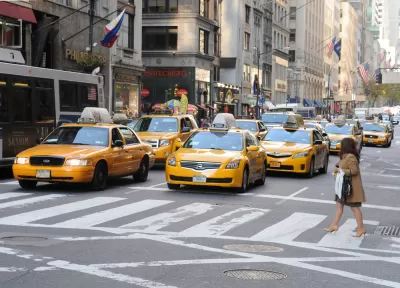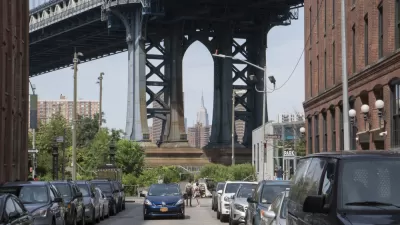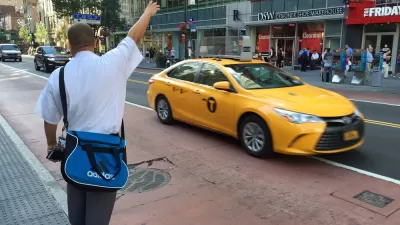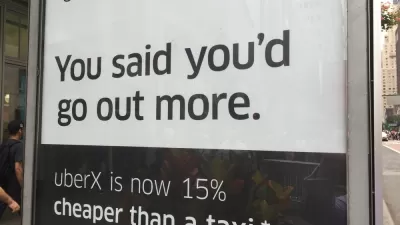A shortage of drivers and spiking demand are driving Uber and Lyft prices higher than ever as the companies struggle to achieve profitability.

A "perfect storm of extremely high demand and extremely low supply" is driving prices for ride-hailing services to all-time highs, reports Alissa Walker in Curbed. "The labor shortage is not unique to ride-hailing, but the situation is particularly dire right now at Uber and Lyft, where morale among its gig workers is low."
In New York City, the shortage is compounded by similar problems in the taxi industry. "There are two-thirds fewer cabs on New York City streets — only 3,500 per day compared to 10,500 before the pandemic — and it’s not clear how many of those taxis will ever return." Meanwhile, New Yorkers are filling the gap with lesser-known options like Via and The Drivers Cooperative.
Mobility advocates hope that the current reckoning will highlight the problems with Uber's unsustainable business model and encourage people to seek other alternatives. "'Uber has been losing billions of dollars for years and years,' says Robin Chase, founder of the New Urban Mobility Alliance." It seems like the days of the "Millennial Lifestyle Subsidy," when techy startups funded by venture capitalists "allowed us to live Balenciaga lifestyles on Banana Republic budgets," are over. According to Chase, "[r]aising their prices is the only way they’ll ever break even or become profitable."
While New Yorkers bought more cars during the pandemic, they also sought out biking and transit options. "Citi Bike posted two all-time daily ridership records on back-to-back days last month," says Walker. "With summer weather ahead, shared scooters soon to hit streets, and 24/7 subway service restored, maybe a few months of high Uber prices won’t be the worst thing for New York."
FULL STORY: Why Your Uber Ride Is Suddenly Costing a Fortune

Alabama: Trump Terminates Settlements for Black Communities Harmed By Raw Sewage
Trump deemed the landmark civil rights agreement “illegal DEI and environmental justice policy.”

Study: Maui’s Plan to Convert Vacation Rentals to Long-Term Housing Could Cause Nearly $1 Billion Economic Loss
The plan would reduce visitor accommodation by 25% resulting in 1,900 jobs lost.

Planetizen Federal Action Tracker
A weekly monitor of how Trump’s orders and actions are impacting planners and planning in America.

Waymo Gets Permission to Map SF’s Market Street
If allowed to operate on the traffic-restricted street, Waymo’s autonomous taxis would have a leg up over ride-hailing competitors — and counter the city’s efforts to grow bike and pedestrian on the thoroughfare.

Parklet Symposium Highlights the Success of Shared Spaces
Parklets got a boost during the Covid-19 pandemic, when the concept was translated to outdoor dining programs that offered restaurants a lifeline during the shutdown.

Federal Homelessness Agency Places Entire Staff on Leave
The U.S. Interagency Council on Homelessness is the only federal agency dedicated to preventing and ending homelessness.
Urban Design for Planners 1: Software Tools
This six-course series explores essential urban design concepts using open source software and equips planners with the tools they need to participate fully in the urban design process.
Planning for Universal Design
Learn the tools for implementing Universal Design in planning regulations.
Caltrans
Smith Gee Studio
Institute for Housing and Urban Development Studies (IHS)
City of Grandview
Harvard GSD Executive Education
Toledo-Lucas County Plan Commissions
Salt Lake City
NYU Wagner Graduate School of Public Service





























